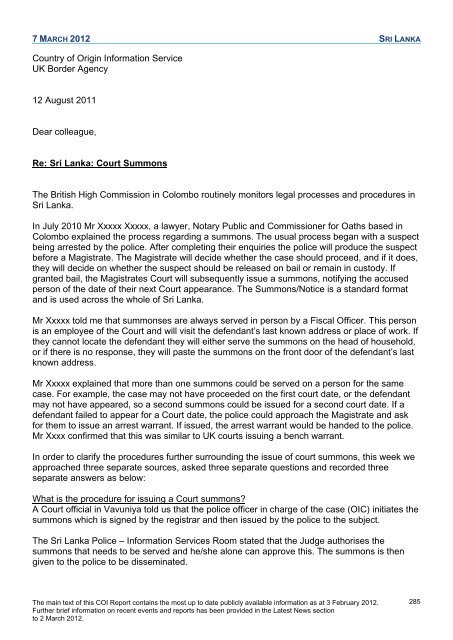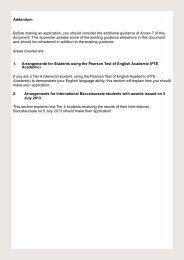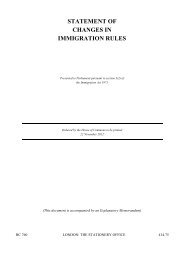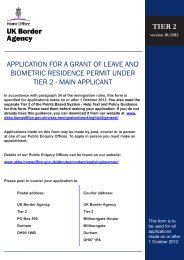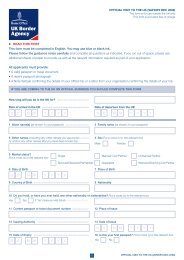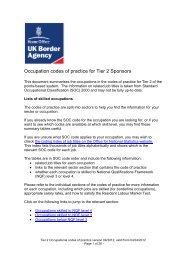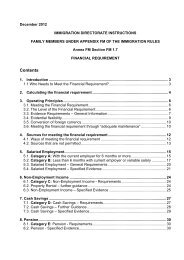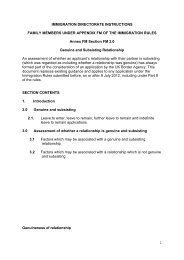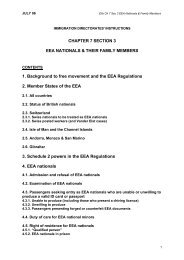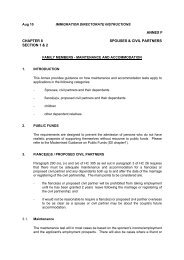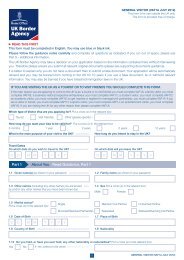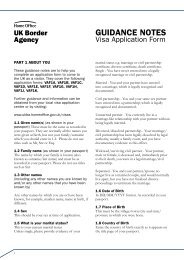- Page 1 and 2:
SRI LANKA COUNTRY OF ORIGIN INFORMA
- Page 3 and 4:
7 MARCH 2012 SRI LANKA Impunity ...
- Page 5 and 6:
7 MARCH 2012 SRI LANKA Annex A - Ch
- Page 7 and 8:
7 MARCH 2012 SRI LANKA vii The Repo
- Page 9 and 10:
7 MARCH 2012 SRI LANKA Latest News
- Page 11 and 12:
7 MARCH 2012 SRI LANKA 15 February
- Page 13 and 14:
7 MARCH 2012 SRI LANKA The State of
- Page 15 and 16:
7 MARCH 2012 SRI LANKA 1.04 There a
- Page 17 and 18:
7 MARCH 2012 SRI LANKA For addition
- Page 19 and 20:
7 MARCH 2012 SRI LANKA 2.06 The Sri
- Page 21 and 22:
7 MARCH 2012 SRI LANKA ―Following
- Page 23 and 24:
7 MARCH 2012 SRI LANKA ―The recen
- Page 25 and 26:
7 MARCH 2012 SRI LANKA ―During 19
- Page 27 and 28:
7 MARCH 2012 SRI LANKA ―The Sri L
- Page 29 and 30:
7 MARCH 2012 SRI LANKA displaced, i
- Page 31 and 32:
7 MARCH 2012 SRI LANKA ―The ICJ i
- Page 33 and 34:
7 MARCH 2012 SRI LANKA ―In press
- Page 35 and 36:
7 MARCH 2012 SRI LANKA "‘We are h
- Page 37 and 38:
7 MARCH 2012 SRI LANKA ―A number
- Page 39 and 40:
7 MARCH 2012 SRI LANKA ―The Unite
- Page 41 and 42:
7 MARCH 2012 SRI LANKA ―The repor
- Page 43 and 44:
7 MARCH 2012 SRI LANKA including th
- Page 45 and 46:
7 MARCH 2012 SRI LANKA developing r
- Page 47 and 48:
7 MARCH 2012 SRI LANKA parliament o
- Page 49 and 50:
7 MARCH 2012 SRI LANKA state of eme
- Page 51 and 52:
7 MARCH 2012 SRI LANKA ―The team
- Page 53 and 54:
7 MARCH 2012 SRI LANKA undertaken t
- Page 55 and 56:
7 MARCH 2012 SRI LANKA ―‗After
- Page 57 and 58:
7 MARCH 2012 SRI LANKA the United N
- Page 59 and 60:
7 MARCH 2012 SRI LANKA of State. Th
- Page 61 and 62:
7 MARCH 2012 SRI LANKA disappearanc
- Page 63 and 64:
7 MARCH 2012 SRI LANKA POLICE See P
- Page 65 and 66:
7 MARCH 2012 SRI LANKA ―The Sri L
- Page 67 and 68:
7 MARCH 2012 SRI LANKA 8.13 Jane‘
- Page 69 and 70:
7 MARCH 2012 SRI LANKA ―According
- Page 71 and 72:
7 MARCH 2012 SRI LANKA taken into a
- Page 73 and 74:
7 MARCH 2012 SRI LANKA ―The Amnes
- Page 75 and 76:
7 MARCH 2012 SRI LANKA article 19 o
- Page 77 and 78:
7 MARCH 2012 SRI LANKA 8.46 On 12 J
- Page 79 and 80:
7 MARCH 2012 SRI LANKA ―Thereafte
- Page 81 and 82:
7 MARCH 2012 SRI LANKA target. The
- Page 83 and 84:
7 MARCH 2012 SRI LANKA ―By statut
- Page 85 and 86:
7 MARCH 2012 SRI LANKA ―In crimin
- Page 87 and 88:
7 MARCH 2012 SRI LANKA detention fo
- Page 89 and 90:
7 MARCH 2012 SRI LANKA 10.06 The AI
- Page 91 and 92:
7 MARCH 2012 SRI LANKA One youth fr
- Page 93 and 94:
7 MARCH 2012 SRI LANKA BAIL/REPORTI
- Page 95 and 96:
7 MARCH 2012 SRI LANKA ―A Court o
- Page 97 and 98:
7 MARCH 2012 SRI LANKA police descr
- Page 99 and 100:
7 MARCH 2012 SRI LANKA received vis
- Page 101 and 102:
7 MARCH 2012 SRI LANKA 11.20 The UN
- Page 103 and 104:
7 MARCH 2012 SRI LANKA periodic ele
- Page 105 and 106:
7 MARCH 2012 SRI LANKA was charged
- Page 107 and 108:
7 MARCH 2012 SRI LANKA ―On 16 Jun
- Page 109 and 110:
7 MARCH 2012 SRI LANKA 14.04 The Fr
- Page 111 and 112:
7 MARCH 2012 SRI LANKA improved, bu
- Page 113 and 114:
7 MARCH 2012 SRI LANKA ―Approxima
- Page 115 and 116:
7 MARCH 2012 SRI LANKA ―On 24 Jan
- Page 117 and 118:
7 MARCH 2012 SRI LANKA ―They disa
- Page 119 and 120:
7 MARCH 2012 SRI LANKA ―However i
- Page 121 and 122:
7 MARCH 2012 SRI LANKA MUSLIMS repo
- Page 123 and 124:
7 MARCH 2012 SRI LANKA 18.03 The US
- Page 125 and 126:
7 MARCH 2012 SRI LANKA another 50,0
- Page 127 and 128:
7 MARCH 2012 SRI LANKA ―The gover
- Page 129 and 130:
7 MARCH 2012 SRI LANKA voice. They
- Page 131 and 132:
7 MARCH 2012 SRI LANKA ―Transgend
- Page 133 and 134:
7 MARCH 2012 SRI LANKA identity fro
- Page 135 and 136:
7 MARCH 2012 SRI LANKA ―The Commi
- Page 137 and 138:
7 MARCH 2012 SRI LANKA ―The body
- Page 139 and 140:
7 MARCH 2012 SRI LANKA on the commu
- Page 141 and 142:
7 MARCH 2012 SRI LANKA Family plann
- Page 143 and 144:
7 MARCH 2012 SRI LANKA For addition
- Page 145 and 146:
7 MARCH 2012 SRI LANKA ―A survey
- Page 147 and 148:
7 MARCH 2012 SRI LANKA are statisti
- Page 149 and 150:
7 MARCH 2012 SRI LANKA ―The Commi
- Page 151 and 152:
7 MARCH 2012 SRI LANKA ―‗In Sri
- Page 153 and 154:
7 MARCH 2012 SRI LANKA ―Women in
- Page 155 and 156:
7 MARCH 2012 SRI LANKA mainly to vi
- Page 157 and 158:
7 MARCH 2012 SRI LANKA ―During th
- Page 159 and 160:
7 MARCH 2012 SRI LANKA ―Commercia
- Page 161 and 162:
7 MARCH 2012 SRI LANKA 21.18 On 7 N
- Page 163 and 164:
7 MARCH 2012 SRI LANKA transit, ret
- Page 165 and 166:
7 MARCH 2012 SRI LANKA activities.
- Page 167 and 168:
7 MARCH 2012 SRI LANKA 21.40 On 17
- Page 169 and 170:
7 MARCH 2012 SRI LANKA ―In additi
- Page 171 and 172:
7 MARCH 2012 SRI LANKA 22.02 The sa
- Page 173 and 174:
7 MARCH 2012 SRI LANKA Besides that
- Page 175 and 176:
7 MARCH 2012 SRI LANKA ―With rega
- Page 177 and 178:
7 MARCH 2012 SRI LANKA Centre is eq
- Page 179 and 180:
7 MARCH 2012 SRI LANKA the public s
- Page 181 and 182:
7 MARCH 2012 SRI LANKA � ―Sri L
- Page 183 and 184:
7 MARCH 2012 SRI LANKA ―For the I
- Page 185 and 186:
7 MARCH 2012 SRI LANKA ―The Tamil
- Page 187 and 188:
7 MARCH 2012 SRI LANKA ―By the en
- Page 189 and 190:
7 MARCH 2012 SRI LANKA the national
- Page 191 and 192:
7 MARCH 2012 SRI LANKA under which
- Page 193 and 194:
7 MARCH 2012 SRI LANKA only three c
- Page 195 and 196:
7 MARCH 2012 SRI LANKA Eastern Prov
- Page 197 and 198:
7 MARCH 2012 SRI LANKA details page
- Page 199 and 200:
7 MARCH 2012 SRI LANKA Returns of r
- Page 201 and 202:
7 MARCH 2012 SRI LANKA � ―invol
- Page 203 and 204:
7 MARCH 2012 SRI LANKA they refer t
- Page 205 and 206:
7 MARCH 2012 SRI LANKA investigatio
- Page 207 and 208:
7 MARCH 2012 SRI LANKA for two days
- Page 209 and 210:
7 MARCH 2012 SRI LANKA facilities.
- Page 211 and 212:
7 MARCH 2012 SRI LANKA displacement
- Page 213 and 214:
7 MARCH 2012 SRI LANKA 'status' but
- Page 215 and 216:
7 MARCH 2012 SRI LANKA villages fac
- Page 217 and 218:
7 MARCH 2012 SRI LANKA government m
- Page 219 and 220:
7 MARCH 2012 SRI LANKA ―People in
- Page 221 and 222:
7 MARCH 2012 SRI LANKA Annex A CHRO
- Page 223 and 224:
7 MARCH 2012 SRI LANKA July Governm
- Page 225 and 226:
7 MARCH 2012 SRI LANKA November The
- Page 227 and 228:
7 MARCH 2012 SRI LANKA united party
- Page 229 and 230:
7 MARCH 2012 SRI LANKA ―Tamil Eel
- Page 231 and 232:
7 MARCH 2012 SRI LANKA the UNP won
- Page 233 and 234: 7 MARCH 2012 SRI LANKA Additional i
- Page 235 and 236: 7 MARCH 2012 SRI LANKA Annex E FORE
- Page 237 and 238: 7 MARCH 2012 SRI LANKA Similarly to
- Page 239 and 240: 7 MARCH 2012 SRI LANKA Country of O
- Page 241 and 242: 7 MARCH 2012 SRI LANKA Country of O
- Page 243 and 244: 7 MARCH 2012 SRI LANKA Country of O
- Page 245 and 246: 7 MARCH 2012 SRI LANKA With regard
- Page 247 and 248: 7 MARCH 2012 SRI LANKA Country of O
- Page 249 and 250: 7 MARCH 2012 SRI LANKA Country of O
- Page 251 and 252: 7 MARCH 2012 SRI LANKA Country of O
- Page 253 and 254: 7 MARCH 2012 SRI LANKA stands at th
- Page 255 and 256: 7 MARCH 2012 SRI LANKA after they h
- Page 257 and 258: 7 MARCH 2012 SRI LANKA Country of O
- Page 259 and 260: 7 MARCH 2012 SRI LANKA security of
- Page 261 and 262: 7 MARCH 2012 SRI LANKA Country of O
- Page 263 and 264: 7 MARCH 2012 SRI LANKA Throughout 2
- Page 265 and 266: 7 MARCH 2012 SRI LANKA the Defence
- Page 267 and 268: 7 MARCH 2012 SRI LANKA see:http://a
- Page 269 and 270: 7 MARCH 2012 SRI LANKA The Departme
- Page 271 and 272: 7 MARCH 2012 SRI LANKA Country of O
- Page 273 and 274: 7 MARCH 2012 SRI LANKA pallets that
- Page 275 and 276: 7 MARCH 2012 SRI LANKA xxxxxxxxx xx
- Page 277 and 278: 7 MARCH 2012 SRI LANKA recorded as
- Page 279 and 280: 7 MARCH 2012 SRI LANKA The Governme
- Page 281 and 282: 7 MARCH 2012 SRI LANKA water supply
- Page 283: 7 MARCH 2012 SRI LANKA as they do i
- Page 287 and 288: 7 MARCH 2012 SRI LANKA Country of O
- Page 289 and 290: 7 MARCH 2012 SRI LANKA This letter
- Page 291 and 292: 7 MARCH 2012 SRI LANKA demand. They
- Page 293 and 294: 7 MARCH 2012 SRI LANKA The base doc
- Page 295 and 296: 7 MARCH 2012 SRI LANKA case was men
- Page 297 and 298: 7 MARCH 2012 SRI LANKA The team fro
- Page 299 and 300: 7 MARCH 2012 SRI LANKA The Senior G
- Page 301 and 302: 7 MARCH 2012 SRI LANKA A Vice Chanc
- Page 303 and 304: 7 MARCH 2012 SRI LANKA accommodate


